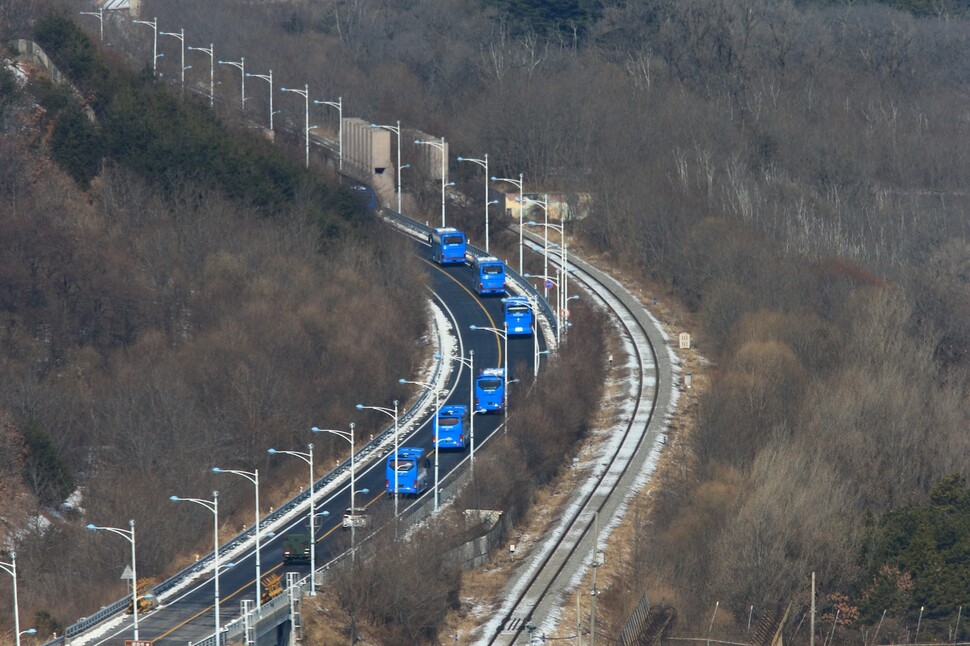hankyoreh
Links to other country sites 다른 나라 사이트 링크
Reporters unable to bring equipment to Mt. Kumgang event due to sanctions to N. Korea

South Korean reporters who were covering an inter-Korean exchange event organized by the private sector at Mt. Kumgang on Feb. 12-13 weren’t able to bring their reporting equipment, including laptop computers and high-performance broadcast-quality cameras. The US government cited sanctions on North Korea as grounds for blocking the equipment from being taken to the event, which was called the 2019 New Year Solidarity Meeting for Implementing the Inter-Korean Joint Declaration.
An official from the Unification Ministry apologetically told reporters on Feb. 12 that they wouldn’t be allowed to bring reporting equipment to the event because the issue hadn’t been resolved in deliberations with the US. Despite repeated questions from reporters who wanted to know whether the US was behind the ban, the official would only say that “deliberations are underway.”
This wasn’t the first time that reporters have been unable to take their laptops with them when visiting North Korea to cover inter-Korean exchange and cooperation projects. During joint railroad inspections of the North Korean sections of the Gyeongui (Seoul-Sinuiju) Line (on Nov. 30-Dec. 5) and the East Sea Line (Dec. 8-17), South Korean inspectors weren’t allowed to take their laptops. The laptops were blocked by the US government’s Export Administration Regulations (EAR), which require approval before taking products containing more than 10% of American-manufactured parts or technology into countries that the US has designated as sponsors of terrorism such as North Korea.
But even taking those regulations into account, the US government is facing criticism for applying its standards arbitrarily and inconsistently. South Korean reporters were able to take reporting equipment into North Korea not only during the reunions of divided families at Mt. Kumgang in Aug. 2018, which received a sweeping exemption from sanctions, but also during the National Unification Conference Commemorating the 11th Anniversary of the Oct. 4 Summit Declaration, an event jointly organized by the public and private sectors and held in Pyongyang on Oct. 4-6, 2018.
Potential political message ahead of second North Korea-US summit
Given such precedent, observers have suggested that preventing reporters en route to the Mt. Kumgang event from bringing their equipment represented a political decision by the US government in the lead up to the second North Korea-US summit.
Perhaps out of concern that this incident would prompt criticism about restrictions on the freedom of the press and the freedom of expression, the Unification Ministry official said that the government would “prevent this kind of thing from happening again by defining consistent standards” about the equipment that reporters are allowed to take into North Korea.
The South Korean delegation attending the event at Mt. Kumgang, which is the first inter-Korean exchange event organized by the private sector this year, consisted of 213 people from all sectors and walks of life, including the seven major religions, civic groups and groups representing women, young people, and farmers. A total of 251 South Koreans are visiting the North, including 10 reporters.
“I’m very glad to have this opportunity on behalf of all Koreans who are struggling to reunify the Korean nation and bloodline before the 100th anniversary of the Mar. 1 Movement,” said Kim Hee-jung, co-chair of the Solidarity Meeting, during a press conference held in the parking lot of Gyeongbok Palace before the group left Seoul. Kim is the Catholic archbishop of Gwangju and co-president of the Korea Conference of Religions for Peace.
By Lee Je-hun, senior staff writer
Please direct comments or questions to [english@hani.co.kr]

Editorial・opinion
![[Editorial] Does Yoon think the Korean public is wrong? [Editorial] Does Yoon think the Korean public is wrong?](https://flexible.img.hani.co.kr/flexible/normal/500/300/imgdb/original/2024/0417/8517133419684774.jpg) [Editorial] Does Yoon think the Korean public is wrong?
[Editorial] Does Yoon think the Korean public is wrong?![[Editorial] As it bolsters its alliance with US, Japan must be accountable for past [Editorial] As it bolsters its alliance with US, Japan must be accountable for past](https://flexible.img.hani.co.kr/flexible/normal/500/300/imgdb/original/2024/0417/6817133413968321.jpg) [Editorial] As it bolsters its alliance with US, Japan must be accountable for past
[Editorial] As it bolsters its alliance with US, Japan must be accountable for past- [Guest essay] Amending the Constitution is Yoon’s key to leaving office in public’s good graces
- [Editorial] 10 years on, lessons of Sewol tragedy must never be forgotten
- [Column] A death blow to Korea’s prosecutor politics
- [Correspondent’s column] The US and the end of Japanese pacifism
- [Guest essay] How Korea turned its trainee doctors into monsters
- [Guest essay] As someone who helped forge Seoul-Moscow ties, their status today troubles me
- [Editorial] Koreans sent a loud and clear message to Yoon
- [Column] In Korea’s midterm elections, it’s time for accountability
Most viewed articles
- 1[Column] The clock is ticking for Korea’s first lady
- 2[Editorial] When the choice is kids or career, Korea will never overcome birth rate woes
- 3S. Korea, Japan reaffirm commitment to strengthening trilateral ties with US
- 4Korea, Japan jointly vow response to FX volatility as currencies tumble
- 5[Guest essay] How Korea turned its trainee doctors into monsters
- 6Japan officially says compensation of Korean forced laborers isn’t its responsibility
- 7US exploring options for monitoring N. Korean sanctions beyond UN, says envoy
- 8Gangnam murderer says he killed “because women have always ignored me”
- 9[Editorial] As it bolsters its alliance with US, Japan must be accountable for past
- 10‘Right direction’: After judgment day from voters, Yoon shrugs off calls for change